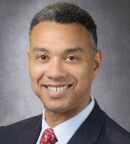
Christopher Flowers, MD, MSc, FASCO
The University of Texas MD Anderson Cancer Center recently announced the appointment of Christopher Flowers, MD, MSc, FASCO, a physician-scientist and leader in oncology, as Division Head of Cancer Medicine. This is the largest academic division at MD Anderson, including 13 clinical academic departments; 3 research academic departments; and numerous programs, laboratories, and patient care centers involving more than 300 faculty and over 2,000 staff members.
“I am honored to have the opportunity to lead such a stellar group of clinicians, scientists, and staff at MD Anderson,” Dr. Flowers said. “I am committed to advancing our efforts in research, patient care, and education, with a focus on innovation and collaboration. Together, we will continue to push the boundaries of cancer medicine, striving to improve outcomes and make a meaningful difference in the lives of those affected by cancer.”
Dr. Flowers joined MD Anderson as Chair of Lymphoma/Myeloma in August 2019 and was named Division Head ad Interim for Cancer Medicine in September 2020. He is an expert in lymphoma clinical care, epidemiology, and outcomes research, as well as an innovator in new drug development.
An active clinician, Dr. Flowers leads research on cancer outcomes, cancer informatics, and early-stage clinical trials focusing on the clinical development of novel therapeutics for B-cell lymphomas. His broader research interests include patient-oriented research in lymphoma and computer microsimulation models aimed at developing strategies to individualize care for patients with cancer and to improve systems of care.
Committed to Research, Patient Care, and Education
Dr. Flowers earned his MD from Stanford University School of Medicine, where he also obtained an MSc in medical informatics to gain expertise in developing information systems to improve clinical research. He completed his internship and residency in internal medicine at the University of Washington in Seattle, where he continued his research training as a fellow in the Robert Wood Johnson Clinical Scholars Program and earned a second MSc in pharmaceutical outcomes research and policy. During this time, he completed his fellowship in medical oncology at Fred Hutchinson Cancer Research Center.

